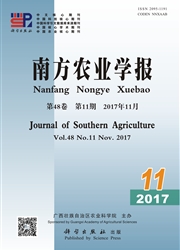

 中文摘要:
中文摘要:
【目的】定量分析广西农民人均纯收入及其构成情况,找出影响广西农民人均纯收入的因素,为研究者与政府决策部门提供参考。【方法】利用广西统计年鉴数据,从性质、来源、农户人均家庭经营收入3个角度来分析2001-2011年广西农民纯收入现状及特点,从经济发展、工业化、城镇化、财政支农支出、农村金融、农民文化程度来分析影响广西农民纯收入的因素,并提出增加广西农民人均纯收入的对策。【结果】2001-2011年广西农民人均纯收入呈上升态势,农民纯收入主要来源于生产性纯收入,非农产业收入在农民生产性纯收入中的比重进一步加大,成为农民收入增长的主要力量。经济发展、工业化发展特别是农产品加工业的发展、城镇化、地方财政、农民文化程度对农民收入提高有正向推动作用,农村金融体制不完善在一定程度上制约着农业的产出和农民收入增长。【建议】通过发展农村基础教育与加大职业培训力度,加快工业化城镇化进程、转移农村劳动力,推进农业产业化经营、提高农民家庭收入,发挥政策作用来提高广西农民人均纯收入。
 英文摘要:
英文摘要:
[Objective]A quantitative analysis on the per capita net income of Guangxi farmers and its composition was conducted to provide references for relevant researchers and policy-making government departments. [ Method ]Using the data from Guangxi statistical yearbook, Guangxi farmers' net income status and characteristics in 2001-2011were analyzed from the aspects of nature, origin and farmers per capita income from household business. The influencing factors of the farmers' income in Guangxi were studied from the angles of economic development, industrialization, urbanization, fiscal expenditure for agriculture, rural finance, and the education level of farmers. The countermeasures were put forward to increase the per capita net income of farmers in Guangxi. [Result]In 2001-2011, Guangxi per capita net income of farmers increased, which mainly came from the net production income. The proportion of non-agricultural income in the farmers' net income expanded and became a major force in the growth of farmers' income. Economic development, especially the development of industrialization, urbanization, agricultural product processing industry of local finance, the education level of farmers had a positive role in improving the income of farmers. The defects in rural financial system in a certain extent restricted the growth of agricultural output and the income of farmers. [Suggestion]The way to increase per capita net income of Guangxi farmers included the development of rural basic education, the increase of occupation training, the acceleration of industrialization and urbanization process, the transfer of rural labor force, the development of breeding industry and the further utilization of the role of policy.
 同期刊论文项目
同期刊论文项目
 同项目期刊论文
同项目期刊论文
 期刊信息
期刊信息
